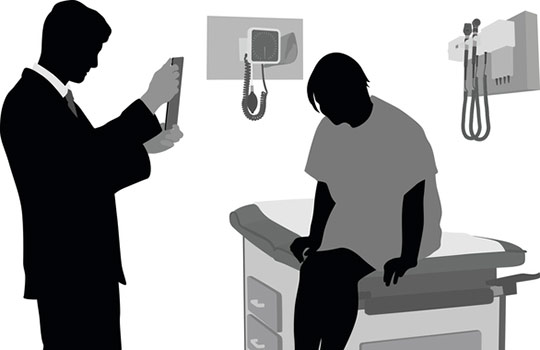There is no magic formula to giving a patient bad news, but a personal touch can help
 A few weeks ago my husband, and best friend, left for an extended business trip many thousands of kilometres away. Given the duration of the trip and that it had been decided with only a few days notice, I was quite unhappy with the idea of being apart. As we were parting at the door, my eyes started to well up and my composure threatened to crumble. We kissed and he paused, “It’s a good life dear, it really is,” he said, as he straightened again. Those simple words were heavy enough to anchor me throughout the coming tumult of more tests and results. He is right, if one can manage to push the often crushing weight of illness and being human aside, it really is.
A few weeks ago my husband, and best friend, left for an extended business trip many thousands of kilometres away. Given the duration of the trip and that it had been decided with only a few days notice, I was quite unhappy with the idea of being apart. As we were parting at the door, my eyes started to well up and my composure threatened to crumble. We kissed and he paused, “It’s a good life dear, it really is,” he said, as he straightened again. Those simple words were heavy enough to anchor me throughout the coming tumult of more tests and results. He is right, if one can manage to push the often crushing weight of illness and being human aside, it really is.
It is a struggle to know how best to give a patient bad news. Unfortunately, there is no magic formula. The challenge is how to be true to your own personality, to be authentic, and yet meet the different needs of the numerous patients who come under your care. But how can one provide the best care, which includes attending to your patients’ emotions, while still maintaining a protective personal emotional boundary? It may not always be possible to do so, nor should it be. Caring is an integral part of providing the best healthcare. Like it or not, some patients or their circumstances will touch you. You should protect yourself from your work, but not your patients.
Seated on a chair against the opposite wall, and seemingly very far away from the hospital bed I was lying in, in the most gentle, yet confident tone, a neurologist gave me my diagnosis of MS. His words were kind, I remember, “It’s not easy to tell someone so young . . . ” Although the room was small, the distance seemed magnified. The news felt like a knockout, with bare knuckles.
A few years later, my family physician told me, in his melodic, singsong voice that I had ” . . . tested positive for SLE.” His caring and sensitivity were palpable. I did not see the left-hook coming, nor did I feel it at the time. He wore kid gloves.
Being given a diagnosis is personal in nature, but uniform in truth; either with or without any sugar coating. Hearing bad news is a double edged sword, opening a waterfall of questions while simultaneously silencing everything, whether it was suspected or not.
A diagnosis can also be a revelation to a patient. The pieces of the puzzle finally fit to form a picture. It brings a sense of relief almost; they have not been imagining or exaggerating their various symptoms. Although it’s a short lived relief, as other emotions begin to tumble into the now vacant space: fear, anger perhaps at having felt trivialized, and more. It may even bring a sense of closure to the vicious game of chase with an unknown “it.” At last, they are believable. But it does little in retrospect to ease the stinging slap on the face of hearing the words, “You are healthier than you think,” and the implications that are redolent therein. It’s the great injustice of being right after all.
For doctors, it’s worth remembering that your words and this moment will last a lifetime so make the effort. You can never take back this one time, this life changing moment for the patient. Pick up the chair in the hospital room and move it to the bedside; even if you get in the way of the nurses, they know why you are there anyway. While it may have been a long day for you, it will be an even longer one for your patient. As busy as you may be, don’t let being rushed show. If the setting allows, come back to check in before you leave; you can be a constant in a new world of uncertainty—even if it is for just one day. If you are referring a patient, assurance in the new doctor goes a long way. Let them know that they will be in good hands.
Write down the name of the diagnosis (I have a what . . . ?!). Have some information at hand, if possible, along with some reliable resources for more information. Perhaps even offer the name of an organisation that can offer links to support groups and other trustworthy, helpful sources. The web is full of misinformed, though well meaning, websites.
In person, be mindful of your body language and soften your words with your posture. Before you utter a sound, think about what you are saying to your patient and where you are saying it from. Please dial my number yourself, be the first voice I hear, and have my file already in front of you. If you are cold and hard, the news will be harsher. I don’t need a hug, but I do ask for solicitude and compassion. I am more than just a patient. I am a person, a daughter, a wife, a sister, an aunt, and a friend.
Today I await the results of a biopsy. When I admitted that I had delayed joining my husband during his trip in order to keep my appointment, the option of a telephone call was offered. I could receive an answer to the question of cancer thousands of kilometres away from home, but with my husband. Rather than be alone, I joined him.
Now here I sit, in a hotel room, waiting for my phone to ring, my thought-out questions written neatly beside it. If the news is bad, I am hoping for a personal touch, the note in my doctor’s voice, something that shows he remembers our brief visits. I want my doctor to find a way to—over the distance—pick up the chair and bridge the gap. To soften his voice and linger for a moment, allowing me time to ask my questions, and if there are words of hope or encouragement that can be said, then to offer them too. I would like a warm, firm handshake—flesh to flesh. This, while the words “It’s a good life dear, it really is” are echoing in my head.
Sharon Roman studied economics at the University of Toronto and Simon Fraser University. She had her first MS attack around the age of 30.
Competing interests: None declared.
